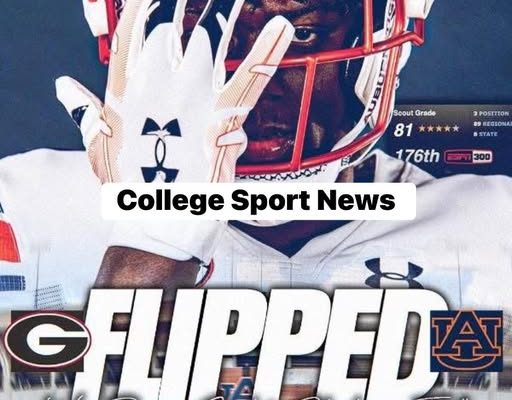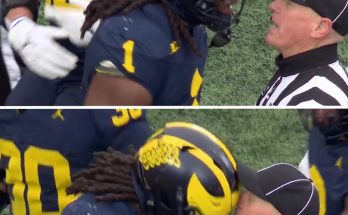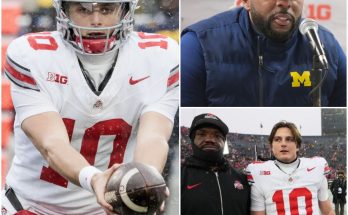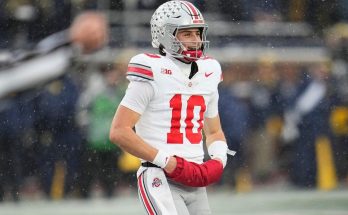In the high-stakes world of college football recruiting, every flip, every verbal commitment, and every rumor can send shockwaves through the SEC. One of the latest seismic shifts comes in the form of Shadarius Toodle, the top-ranked inside linebacker in the SC Next 300, who has officially flipped his commitment from Georgia to Auburn. This move not only reshapes Auburn’s defensive recruiting landscape but also has wider implications for the balance of power in the SEC. In a conference defined by dynasties, tradition, and razor-thin margins between elite programs, Toodle’s decision is one of those moments that can redefine trajectories and spark debates among fans, analysts, and coaches alike.
Shadarius Toodle is not just another highly rated recruit; he is the kind of player who carries both talent and potential to dominate at the collegiate level. Ranked as the No. 3 interior linebacker nationally by SC Next 300, Toodle possesses the rare combination of size, speed, and football IQ that makes him a force in both run-stopping and pass coverage. At a time when the SEC continues to elevate its defensive schemes and athleticism, acquiring a player of Toodle’s caliber is akin to securing a cornerstone piece in a championship puzzle. Auburn’s coaching staff, led by their defensive architects, will now have the opportunity to mold Toodle into a game-changing presence, someone capable of altering the dynamics of an entire defense and serving as a leader on and off the field.
To understand the magnitude of Toodle’s flip, it is important to contextualize what Georgia represents in college football recruiting. Georgia, under the guidance of Kirby Smart, has established itself as a defensive powerhouse and a factory of NFL-caliber talent. Securing a commitment from a top-tier linebacker like Toodle would have been seen as a natural continuation of Georgia’s dominance in producing elite defensive talent. For Auburn to pull him away from such a program is a testament to both Auburn’s persuasive recruiting approach and Toodle’s personal vision for his future. Flipping from a perceived national powerhouse to a program that is actively rebuilding and aiming to reassert itself atop the SEC shows that Toodle is not just chasing prestige; he is seeking opportunity, fit, and the ability to make an immediate impact.
The flip also underscores a broader trend in college football recruiting: the increasing mobility and agency of young athletes. With NIL deals, social media presence, and a heightened understanding of fit and coaching philosophy, prospects are more empowered than ever to make decisions that go beyond traditional program prestige. Toodle’s decision reflects a calculated choice where the environment, coaching style, and long-term career considerations likely played a major role. Auburn, with its renewed focus on defensive identity and aggressive recruiting strategy, appears to have provided the exact combination of resources, vision, and player development Toodle was looking for.
For Auburn, this flip is not just about acquiring a top talent; it signals a potential shift in recruiting momentum within the SEC. Georgia, Alabama, LSU, and other established programs have long dominated the top defensive recruit market. Auburn’s ability to land a recruit of Toodle’s caliber is an indicator that the Tigers are not only competing but also making a statement: that they are a destination program capable of competing for elite talent, even in the face of traditional SEC powerhouses. This flip could have a domino effect, boosting Auburn’s profile for other top prospects who may now see Auburn as a viable option to maximize exposure, playing time, and development.
The timing of the flip is also significant. Auburn’s defense has been under scrutiny in recent seasons, and while the Tigers have had success at different intervals, consistency has remained elusive. Adding a talent like Toodle can be a catalyst for change, particularly in the linebacker corps, which is central to both run defense and pass coverage schemes. Toodle’s versatility—his ability to read the quarterback, disrupt running lanes, and cover tight ends or running backs in space—fits perfectly within Auburn’s defensive philosophy. The Tigers are not just adding talent; they are adding a game-changer, someone capable of altering how opponents approach their offense and forcing schemes to adapt.
Beyond the immediate on-field impact, Toodle’s flip has implications for recruiting strategy and perception. In the ultra-competitive SEC landscape, a single high-profile commitment can influence the decisions of other prospects. When a top-tier recruit like Toodle chooses Auburn over Georgia, it sends a message: Auburn is a program that can attract and retain elite talent, a program on the rise rather than one playing catch-up. Recruits often look for both immediate opportunity and the promise of being part of something bigger, and Auburn’s successful courting of Toodle positions them as a program offering both.
Fans of Auburn are understandably thrilled, as the Tigers have historically been known for their passionate fanbase, strong tradition, and identity as a program that can punch above its weight. Toodle’s arrival adds fuel to an already fervent excitement, particularly as Auburn seeks to challenge for SEC supremacy and make a return to national prominence. Defensive strength has always been a hallmark of championship teams in the SEC, and adding a player of Toodle’s caliber provides a tangible upgrade in this critical phase of the game. His presence could elevate not just individual performance but also overall defensive cohesion, mentoring younger players, and establishing leadership standards that transcend the field.
Critics may point out that recruiting rankings do not always translate into collegiate dominance, and success in college football depends on a multitude of factors including scheme fit, coaching, health, and mental toughness. While these are valid considerations, Auburn’s track record of developing players for the next level, coupled with Toodle’s elite athleticism, creates an environment conducive to success. The combination of talent, work ethic, and opportunity is potent, and if Toodle’s transition is managed effectively, Auburn could be looking at a transformative player capable of anchoring their defense for years to come.
Furthermore, the flip highlights an interesting narrative about program identity and player priorities. While Georgia offers a legacy of championships and a proven NFL pipeline, Auburn offers a unique proposition: a chance to be part of something being built, a chance to lead rather than follow, and a chance to leave a personal legacy. For players like Toodle, the decision is not merely about program reputation; it is about aligning personal goals with program trajectory, coaching philosophy, and long-term development opportunities. This perspective is increasingly shaping modern recruiting battles, where top recruits weigh not just the historic success of a program but also their projected role, visibility, and opportunity to make an immediate impact.
The ripple effects of Toodle’s flip will likely extend beyond Auburn’s campus. Rival programs will reassess their recruiting strategies, particularly in the linebacker market, as they recognize Auburn’s ability to successfully compete for high-profile prospects. Coaches may intensify their efforts, re-evaluate pitches, and examine how Auburn is presenting itself to recruits. The SEC, already a conference of intense competition and high stakes, could see subtle shifts in recruiting power dynamics as programs respond to the changing landscape.
From a broader perspective, Toodle’s flip also serves as a case study in modern college football recruiting. It underscores the importance of relationship-building, understanding player motivations, and tailoring pitches to align with individual goals. Auburn’s coaching staff clearly recognized Toodle’s priorities and successfully presented a vision compelling enough to convince him to choose the Tigers over a historically dominant Georgia program. This is an example of strategic recruiting execution at its finest, combining talent evaluation, player engagement, and strategic narrative to secure elite talent in a competitive market.
Ultimately, Shadarius Toodle’s decision to flip from Georgia to Auburn is more than a headline; it is a moment of potential transformation. For Auburn, it represents a step toward rebuilding a defense capable of competing at the highest level of the SEC. For the SEC landscape, it signals that traditional hierarchies can be challenged and that program reputations, while important, are not insurmountable. For recruits, it illustrates that thoughtful, strategic decisions about fit, opportunity, and long-term development can outweigh conventional wisdom and program prestige. In every sense, Toodle’s flip embodies the evolving nature of college football recruiting and the exciting unpredictability of the SEC, where a single decision can ignite conversations, inspire fans, and shape the future of programs across the conference.
As Auburn fans celebrate the arrival of Toodle, coaches and analysts alike will be watching closely to see how this commitment translates on the field. Can Toodle elevate Auburn’s defense to a new level of dominance? Will this flip inspire other top recruits to consider the Tigers as a serious destination? The answers will unfold over the coming seasons, but one thing is clear: Shadarius Toodle’s choice has already left an indelible mark on the recruiting landscape, a testament to his talent, vision, and the power of a single game-changing decision in the world of college football. Auburn has landed a top-tier talent, and the ripple effects are just beginning. The SEC may never look the same again.



